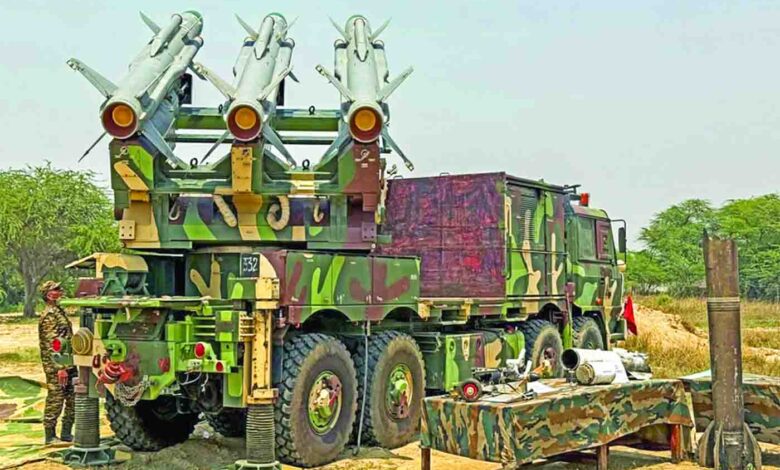India’s semifinal victory in the fight against terrorism

Thursday, 22 May 2025 | in Analysis
Ashok Kumar
The message of Operation Sindoor was clear: the path to a secure, developed, and globally respected India — Viksit Bharat — demands continued resolve, multidimensional preparedness, and an unflinching stand against terrorism in all its forms
In a bold reaffirmation of India’s commitment to counter cross-border terrorism, Prime Minister Narendra Modi established a ‘new normal’ through Operation Sindoor as a strong response to Pakistan-sponsored terrorism. This operation, which featured deep and precise strikes on terror camps located not only in Pakistan-occupied Kashmir (PoK) but also well within Pakistan’s heartland, was unprecedented. It showcased India’s strong willpower, operational maturity, and ability to deliver high-precision strikes with minimal collateral damage. India’s air defence capabilities were proven effective in neutralising advanced and coordinated drone threats. The successful hits on strategic air bases of Pakistan underscored India’s operational readiness and deterrent strength.
Yet, as PM Modi remarked, “We will keep taking decisive steps,” which subtly foreshadowed that a full-scale final confrontation is inevitable. Although the exact timeline remains uncertain, decisive engagement appears to be a necessary milestone toward realising the vision of Viksit Bharat — a developed, secure, and globally respected India. Therefore, India needs a multidimensional and proactive strategy to prepare for the final stage of this prolonged conflict.
Diplomatic Front
Despite the operational success, the global diplomatic response did not meet our expectations. China, predictably, stood by its long-time ally Pakistan. The United States, while posturing as the champion of global peace, took a balanced, almost ambivalent stance, attempting to preserve its strategic interests on both sides. The European Union, meanwhile, continued to misinterpret the conflict through a limited prism of the Kashmir issue, failing to grasp the larger menace posed by Pakistan, which is the epicentre of terrorism the world over.
The short-duration conflict has made it amply clear that India was not just fighting Pakistan; rather, it appears to be a broader coalition of actors who perceive India’s growing assertiveness as a threat to their geopolitical agendas. This apprehension reached new heights after Operation Sindoor, where India’s swift, coordinated and targeted strike incapacitated multiple Pakistani military installations, including airbases, radars, drone depots, and air defence systems.
Western powers must reassess their assumptions. While China continues to back Pakistan both economically and militarily, India remains the most stable and democratic partner capable of upholding a rules-based global order in the Indo-Pacific region. The United States, in particular, must recognise that strengthening India is strategically aligned with its interest in counterbalancing Chinese expansionism. However, the American response so far indicates a hesitancy to decisively back India — opting instead to maintain a superficial equilibrium between India and Pakistan. This approach is neither sustainable nor strategic. More importantly, India has to make efforts to shift the prevailing global narrative. The world must be reminded that the Indo-Pak conflict is not simply a territorial dispute over Kashmir — it is fundamentally a battle against state-sponsored terrorism. Pakistan remains a breeding ground for radical Islamic ideologies that have manifested in global tragedies such as the 9/11 attacks, London bombings, Madrid train attacks, and the Charlie Hebdo massacre. These events are enough evidence that the terror ecosystem nurtured by Pakistan’s military intelligence, especially the ISI, has global ramifications.
India must proactively convey to the West that Kashmir has been an integral part of the Indian civilisation for thousands of years. Unlike Pakistan, which was founded on a rigid two-nation theory, India is a vibrant, pluralistic, and multi-polar democracy that cannot be confined within communal or sectarian boundaries. This historical and cultural context must be highlighted consistently in global forums to counter Pakistan’s manipulative propaganda. We need to actively counter-propaganda to reshape the Western perspective on the Kashmir issue.
External Security/Military Front
In the aftermath of the Pahalgam incident and the latest escalation with Pakistan, there is no scope for complacency. The emerging battlefield is not limited to traditional warfare — technological superiority is now decisive. China’s rapid advances in military tech, artificial intelligence, and unmanned systems must alert us to the urgency of preparedness. There is no room for laxity. Constant feedback loops from ground-level intelligence, robust cybersecurity infrastructure, and rapid response mechanisms must become the norm.
To effectively counter the growing China-Turkey-Pakistan nexus, India must ensure that it retains a decisive edge in armaments and warfare doctrine. Superior technology, robust logistics, and interoperability across forces are non-negotiable. This preparation must take place with the knowledge that while Pakistan appears on the back foot, its backing from China gives it a dangerous strategic cushion.
The Border Security Force (BSF) currently fulfils its peacetime mandate well, leveraging its familiarity with the terrain and local intelligence. However, it must now evolve into a battle-ready force capable of handling wartime contingencies. This includes enhanced access to artillery support, drone and counter-drone technology, as well as electronic warfare capabilities. Training modules should be updated, and regular joint exercises with the Indian Army must become a routine to ensure coordination during high-stress scenarios.
Internal Security Front
Internal security presents equally pressing challenges. One of the most serious is illegal immigration, particularly from Bangladesh. In 2016, then Minister of State for Home Affairs Kiren Rijiju stated that “as per available inputs, there are around 20 million illegal Bangladeshi migrants staying in India.” This mass influx not only strains local resources but has also begun altering demographic compositions in sensitive border states — posing both security and social threat. Implementing the National Register of Citizens (NRC) is imperative. However, it must be done transparently and fairly, shielded from political agendas and vote-bank compulsions. Handling illegal immigration with an iron hand is the need of the hour so that demographic changes can be stopped.
To maintain national harmony, India has to take strong steps against anti-national elements who are out to exploit societal divisions. India is under constant assault from psychological and information warfare, much of it orchestrated by hostile actors across the border. These campaigns are designed to sow discord, spread fake narratives, and erode the nation’s trust in its institutions. Social media has emerged as the frontline for such attacks and combating them requires a blend of technological vigilance and legal framework. We must consistently reinforce values of unity, national pride and patriotism. Fake news, hate speech and misinformation must be countered strongly.
In Conclusion
As India stands at a pivotal moment in its security journey, Operation Sindoor must be recognised not as a finale, but as a resounding declaration of intent. It represents India’s capability, resolve, and strategic acumen. However, the road to a decisive final confrontation will demand far more — visionary diplomacy, state-of-the-art military readiness, iron-clad internal unity, and above all, an unflinching political will. This is no longer just a regional struggle — it is a defining moment for India’s role as a global power. The semifinal has been decisively won. Now, the time has come to prepare — strategically, diplomatically, and militarily — for the final. Victory will pave the way for a truly Viksit Bharat.
(The writer is a retired DGP, Uttarakhand. He is currently serving as Vice Chancellor of Haryana Sports University. Views expressed are personal)






